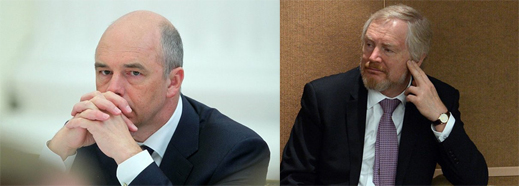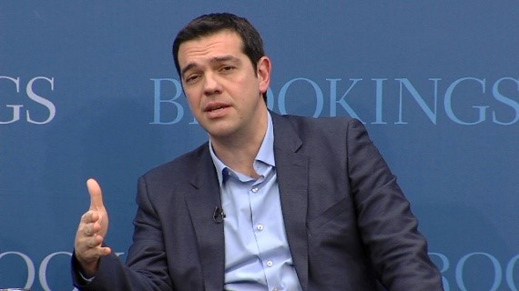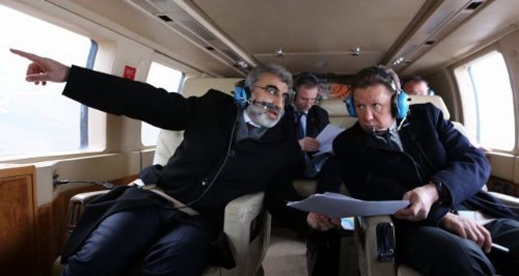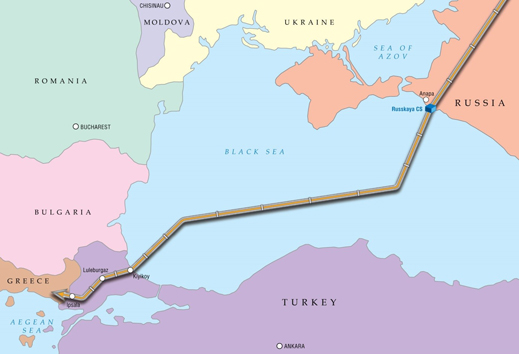Yves here. Helmer’s post confirms our view that Russia will not rescue Greece, and for many of the same reasons that we’ve stated.
By John Helmer, the longest continuously serving foreign correspondent in Russia, and the only western journalist to direct his own bureau independent of single national or commercial ties. Helmer has also been a professor of political science, and an advisor to government heads in Greece, the United States, and Asia. He is the first and only member of a US presidential administration (Jimmy Carter) to establish himself in Russia. Originally published at Dances with Bears
The Kremlin doesn’t want to say so exactly. But right now it is as reluctant to support the Greek Government in its conflict with Germany, as Joseph Stalin and the Soviet Politburo wanted to back the Greek Communist Party during the Greek civil war between 1946 and 1949. So, when Foreign Minister Sergei Lavrov (right) met in Moscow with Greek Foreign Minister Nikos Kotsias (left) two weeks ago, he offered Athens a hypothetical conditional: “Russia is also in a tough financial situation caused by a unilateral illegitimate policy of our Western colleagues. However, if the government of Greece ever comes up with any requests then, as Finance Minister Anton Siluanov said, they will, of course, be considered…”
Speaking a few hours before on Athens television, the new Greek Defense Minister Panos Kammenos proposed the Greek hypothetical conditional: “if we see that Germany remains rigid and wants to blow apart Europe, then we have the obligation to go to Plan B. Plan B is to get funding from another source. It could the United States at best, it could be Russia, it could be China or other countries.”
Asked to say what Greek Government requests Finance Minister Siluanov is considering, the ministry spokesman said today – nothing. That’s to say, the Greeks haven’t proposed a Plan B, and if they do, the Russian response will be — nothing. The Russian reason – the new Greek Government, like its predecessors, is regarded by the Kremlin as a US client, engaged in secret dealings with Washington which would put a Russian loan, if it were extended, at risk of being wasted, or lost.
In an American television interview on January 30, Siluanov had said: “we can imagine any situation, so if such [a] petition is submitted to the Russian government, we will definitely consider it, but will take into account all the factors of our bilateral relationships between Russia and Greece, so that is all I can say. If it is submitted we will consider it.”
Asked today to clarify Siluanov’s hypothetical conditional – had the Greeks proposed any form or value of a Russian loan – the spokesman for the Finance Ministry in Moscow replied: “we do not comment on this topic before the decision will be taken.”
In the circumstances, this was being diplomatic. Siluanov’s (below, left) deputy for international relations, Sergei Storchak (right) very clearly said no on Tuesday. Storchak was quoted by the state news agency RIA-Novosti as saying that financial aid to the government in Athens is excluded because there is no budget allocation. “To date, [financial aid to Greece] is ruled out because the law on the federal budget does not provide such facilities.”

Asked whether a Moscow loan in Plan B has been tabled, the new Greek Ambassador in Moscow, Danai-Magdalini Koumanakou, said through a spokesman that she would consider her answer, and decide when to give one. Koumanakou presented her credentials to President Vladimir Putin four months ago, on October 23. She is still considering what to say.
At the start of 1949, when the Politburo was discussing what assistance to provide the Greeks, the country had already recorded a loss of more than 100% of its GDP caused by the invasions of the Italian and German armies. The civil war, triggered by British forces in December 1944 and funded on the Greek Government side by the UK and US, halted the post-war recovery of Greece, so that it lagged far behind the recovery of the countries which had been occupied during the world war; and also behind the enemy states, Italy and Germany. The one sector of the Greek economy to benefit until 1950 was the military, police, and security agencies. Altogether, they received $400 million from Washington; that’s equivalent to $4.4 billion today. A recent econometric calculation indicates that the annual loss of Greece’s GDP growth, counting destruction of livestock and non-agricultural capital, unemployment, casualties and displacement of population during the civil war was 12.15% per year until the war ended in August 1949.
The GDP loss in Greece since the start of the German-directed EU bailout programme has been about 30%; That’s an annual rate of almost 6% or about half the loss rate inflicted by the German invasion or by the civil war. The casualty rate – dead and wounded – is less today; the displacement rate – from village to city or emigration – almost the same.
Stalin’s decision not to contest Greece with the Americans, and the calculation in Moscow at the time of higher priority state interests have been well documented. Less well-known is the calculation of the last Soviet Politburo in 1989, then ruled by Mikhail Gorbachev: he decided not to come to the aid of Prime Minister Andreas Papandreou, who requested assistance ahead of the parliamentary election of June 1989. Papandreou lost that election.
The calculation this time round is unchanged. The new Prime Minister, Alexis Tsipras, is viewed in Moscow as a closet American.

Greek assessments of Tsipras’ current negotiating tactics with the European Union (EU) come to the same conclusion. Tsipras conceded as much in an interview he gave the German magazine Stern on February 19. Asked if President Vladimir Putin has promised money, Tsipras replied: “if only it were so easy to accumulate the funds. But it’s true — Russia’s ambassador was the first diplomat to congratulate me. However, prior to that I received a phone call from President Obama. And later on from President Putin and the Chinese premier. It just goes to show how much global interest there is in Greece continuing on its path to stability and returning to growth.”
“Q: Do you want money from Russia or from China? A: “For the time being, we only have a European solution in mind. We as a country belong to the eurozone. It would be a mistake to jeopardise this political unity. We are fully aware of the key geopolitical role Greece plays in the world, and we will continue to be a stable anchor in a fragile tri-border region.”
Russian strategic analysts do not agree that Greece is as important as Tsipras claims, nor as stable. Alexei Pushkov, chairman of the Duma Committee on Foreign Affairs, said he refuses to discuss Greece. Sergei Karaganov, head of the Council for Foreign and Defense Policy, prefers discrete silence. Yury Kvashnin, head of the EU studies sector at the Institute of World Economy and International Relations in Moscow, says the new Greek government is pretending to approach Moscow in order to play at “blackmail” with the EU.
“[Tsipras says to the EU] you are going to make concessions on the debt issue for us, and we in our turn will be ready to reconsider our position on the future relations with the Russian Federation. Thus, it appears that at the moment the tactical interests of Russia and Greece are the same. It can be expected that as long as there is no settlement of the Greek debt issue, there will be very warm relations between Russia and Greece. I do not exclude that there will be mutual visits at the highest level, and a lot of words will be spoken about friendship, about the need for partnership between the two countries, the necessity for deepening economic cooperation.”
“However, we must understand that Greece is an integral part of the Euro-Atlantic structures. It is part of the EU, it enters into NATO. Therefore strategically the main purpose for Greece is to stay in these structures, but on more favourable terms. So I think that now we will see some warmth in the relations between Russia and Greece . Everything will be well and good. But in the future, of course, all this may come to naught. That is, of course, if Greece to manages to agree on restructuring their public debt.”
Gazprom said this week it is not less skeptical of Greek intentions, and much more confident of Turkey’s strategic importance by contrast. Asked if the Tsipras government has requested talks on new pipeline deliveries to Greece, a Gazprom spokesman implied no, but replied with a hypothetical conditional: “it’s better to ask first the government of Greece about this issue, and after that we will be able to respond.”
The source also noted that early this month Gazprom chief executive Alexei Miller (below, right) toured eastern Turkey with Turkish Energy Minister Taner Yildiz (left) and discussed the route of Turkish Stream, the renamed South Stream pipeline project which was cancelled after EU pressure last December.

According to Gazprom, if the Greek government wants Russian gas, it is welcome to build a pipeline to Ipsala, on Greece’s western border with Turkey, to buy it. The Gazprom release says its priority in the meantime is delivering gas to meet rising Turkish demand. “The parties defined the key reference points of the route and technical solutions for the gas pipeline in Turkey. In particular, the meeting chose the landfall location – near Kiyikoy village, the gas delivery point for Turkish consumers in Luleburgaz and a border crossing between Turkey and Greece in Ipsala. The gas pipeline length will total 180 kilometers. In the near future a permit is to be obtained for conducting FEED operations for the new Turkish offshore section. The growing demand for natural gas in the Istanbul district will be taken into account in the gas pipeline design; therefore, the volume of gas to be delivered to the border between Turkey and Greece was specified and estimated at 47 billion cubic meters. The capacity of the offshore gas pipeline from Russia to Turkey will amount to 63 billion cubic meters a year, the first string is to be completed by December 2016.”

Alexei Makarkin, an analyst with the Center for Political Technologies in Moscow, refuses to answer direct questions on Russia’s Greek strategy. He recently published a warning that, for the time being, “[Greek] rhetoric, as is often the case, is much more radical than real action. So, at a meeting of EU foreign ministers on January 29, Kotsias did not block a decision to extend sanctions against Russia, and even conceded some expansion… The new ‘sectoral’ sanctions have not been approved, but this is associated with the position, not only of Greece, but also of a number of other EU countries — Italy, Hungary, Cyprus, and perhaps France…The Greek government will continue manoeuvering, trying to find a common language with the European centre-left and get their relief in the economic sphere. In this case, it will make active use of the Russian factor to put pressure on the EU (as does the Hungarian Prime Minister Viktor Orban…”
Moscow analysts of Greece dismiss claims published in US and UK media that there is an influential relationship between Ministers Kotsias and Kammenos and Konstantin Malofeev (below, left), the financier of Orthodox causes and the Novorussian resistance to Kiev, and Malofeev’s ideologist, Alexander Dugin (right).

US Government radio, the Financial Times, and Der Zeit have reported this month: “Powerful Russians want to drive a wedge into the EU and are fighting for Moscow’s dominance. Confidential emails reveal how they are influencing the Greek government.” Malofeev and Dugin are the “powerful Russians”, Kotsias and Kammenos the influential figures in the Greek government.
According to Sam Jones, NATO spokesman at the Financial Times, “European and Nato intelligence officials are now poring over links between the Kremlin and senior figures from Syriza and its coalition partner, the Independent Greeks party… Mr Kotzias — a former Piraeus university professor — has espoused increasingly nationalist positions, developing a relationship with Alexander Dugin, the Russian nationalist philosopher, during several visits to Moscow, according to a colleague who declined to be identified. Mr Dugin, who is close to several figures in the Moscow security establishment and last August called for a ‘genocide’ of Ukrainians, was invited by Mr Kotzias to speak at an event in the Piraeus campus in 2013, where he extolled the role of Orthodox Christianity in uniting Greeks and Russians. Mr Kammenos has also been a frequent visitor to Moscow. A picture shows him in the Russian capital two weeks ago, meeting the chairman of the Russian Duma’s foreign affairs committee and the deputy chairman of its defence committee.”
Dugin asked to be paid for an interview before he would respond to questions. For the source of the state bank funds which Malofeev has been spending, read this. Malofeev describes his financial contributions in Crimea and Donbass as religiously-inspired philanthropy and humanitarian aid; he denies funding troop formations or military operations.” According to a source close to Kremlin policymaking, “whatever contacts they may have had with the Greeks make no difference to Kremlin policy. That’s because neither the two Russians, nor the two Greeks make a difference.”


How about a Plan C, i.e., initiating a new act from the new BRICS bank ( or ADB “courtesy Asian” stretch)?
Couldn’t Greece play a 2-way split, with part to IMF/ECB, and part to the new BRICS bank, and remainder in bonds?
The BRICS bank is only for infrastructure development, and then only in the five funding members’ countries:
http://en.wikipedia.org/wiki/New_Development_Bank
Thank; of course it makes perfect sense after you indicate it!
Yet doesn’t this debacle almost point to a need for an IMF alternative in a situation like this?
Does anyone see what Mr Market’s traders are saying on Wall Street about this situation? Sorry for my ignorance, but are there Grexit hedge funds playing this, like they do the elections or Super Bowl?
strategically, i can see only three players interested in greece (unlike say spain or italy). eu, usa, or russia. for china it’s much easier/better to court someone like turkey or egypt in med than greece.
China really only cares about the passage of goods. This is why it has bought ports in Greece. The road infrastructure in Turkey doesn’t allow it to send goods through the gulf and straits to Turkey and then into the Balkans. Greece, on the other hand, allows for ports and roads right into the heart of Europe.
you are aware that a non-trivial part of turkey lies on the west side of bosphorus? if greece has been kicked out of eur (which implies out of eu, since i don’t believe it can be legally kicked out of eur without being kicked out of eu), bosphorus becomes more important to china than any port in greece.
The roads or whatever have to go through the non-eu Balkans, where the roads are not good. Rail is non-existent.
Please review the topography north of Greece.
Why would Russia want to pay money to the financial empire encircling it? Russia would work with Greece after it rejects the debt, not pay their debt for them. If outside loans really is Greece’s Plan B, Syriza doesn’t really stand for change at all.
It looks like this is more of a rhetorical gambit than an actual plan. Think about it. If the Greeks actually thought they had a chance of Russia funding its debt obligations and stabilizing its currency upon Grexit, then why would they carry on those negotiations publicly now? They’d just negotiate quietly, while making soothing noises to Europe until they had a deal in the bag, and then announce it as a coup de main. Same with the U.S.
But, if instead their only purpose was to make threatening noises in order to put pressure on the Germans (perhaps through the intervention of the US), then they would do exactly what they are doing – publicize the possibility of Russian involvement in Europe.
Of course, it seems to have back-fired, since the only response they’ve gotten (outside of the predictable Russian denials) is to get war-hawks in NATO hyper-ventilating: “poring over links between the Kremlin and senior figures from Syriza and its coalition partner, the Independent Greeks party”. In short they’ve triggered the traditional U.S. suspicion about “commies” in government threatening NATO without accomplishing any useful objective.
My guess would be that the U.S. intelligence services will now be making up their own contingency plans for a military coup in the event that Syriza really made a move to take Greece out of NATO. But, of course, the Russians are right. So long as Greece remains firmly within the NATO alliance (and there’s no sign of any change on that front), then there’s no reason for Russia to extend them any funding.
It might be different if the government told the Russians that they were willing to cancel U.S. basing rights in Greece or something along those lines, but that would be a wildly dangerous avenue to approach.
An alternative view would suggest that Syriza is attempting to prod the US to offer them greater support by threatening a move towards Russia, but historically during the cold war any government that tried that was labeled as communist and the US would attack them the way Nixon did with Chile prior to the 1973 coup.
I can’t see how any of this is going to help Greece, but it may all just die down into nothing. It really amounts to no more than Tsipras saying “I wish the Americans would help us. Preferably the US or if not them, then Russia.” But, after all, neither of those countries is going to lift a finger to help Greece. Obama is currently busy attempting to extend Neo-liberalism via his Pacific Trade Zone proposal and Russia has enough troubles dealing with the Ukraine.
That’s a pretty blistering indictment of Syriza’s plans. Offer a rhetorical gambit that is at face value obviously ridiculous?
The Germans would love for the Greeks to get money from the Russians to pay off the bank debt. That’s not a threat; that’s winning the lottery.
I believe that the last Greek Prime Minister to have good relations with Russia was Karamanlis. I don’t know if this is based in fact or just a conspiracy theory, but here is what many believed happened as a result:
http://rt.com/news/plot-kill-karamanlis-russia-649/
He was replaced, after snap elections, by Prime Minister George Papandreou who handed Greece to the IMF. I must say also that Karamanlis’s absence from public life is curious, especially because he preceded the entrance of the hated Troika in Greece and remains a respected figure. In my opinion, New Democracy would have had a better chance of winning in the last election under him than under the unpopular Samaras.
I will put forward the suggestion that the EU is currently in transition mode. I base this upon the developments in Ukraine, and on the past analysis of the cookie lady’s attitude towards the EU. Bolstered now by German government’s acceptance of the Greek proffer, at least for now.
Everyone, it seems to me, including Russia, is buying time. For Greece to be willing to keep the EU intact, even on the very fragile grounds of its practical needs and what it can promise to do, is a huge plus for that entity, which is gradually turning away from surrender to the US, as are many countries. The metamorphosis is not now being accomplished by swift cleavages, but being accomplished it is.
It is in Russia’s interest that the EU remain in partnership mode. And that really is good for everyone, even if the present US government is sticking with ‘freedom fries.’
I’ll just add thanks for this comprehensive article, plus a quote from a counterpunch article by William Blum that a previous commenter had linked:
“…Another charming chapter in US-Greek relations occurred in 2001, when Goldman Sachs, the Wall Street Goliath Lowlife, secretly helped Greece keep billions of dollars of debt off their balance sheet through the use of complex financial instruments like credit default swaps. This allowed Greece to meet the baseline requirements to enter the Eurozone in the first place. But it also helped create a debt bubble that would later explode and bring about the current economic crisis that’s drowning the entire continent. Goldman Sachs, however, using its insider knowledge of its Greek client, protected itself from this debt bubble by betting against Greek bonds, expecting that they would eventually fail…”
Perhaps Germany is not the ‘bad guy’ here.
….or at least not the only tapeworm in the Greek gut…
Ridiculous to think Russia would loan money to Greece to pay loans to EZ… loans that amount to hundreds of billions! Always a non-starter.
However, if Greece asked for an oil loan to cover their oil needs for a while following Grexit…
That would be a horse of a different color.
Greece imports nearly 500k barrels/day, or about $25,000,000/day at today’s price. US 9 billion/year… substantial, but Russia could supply this if they wished, say for a couple of years, while Greece puts the unemployed to work on infrastructure etc, tourism returns because no more protests, and growth returns.
Why would Russia do that? First to spite EZ who would hope for Greek collapse following Grexit, second because stagnant world demand for oil. And, playing a longer Great Game, Russia wants a port on the Med, and the one in Syria is very unstable. Meanwhile Russia is no doubt still pissed that EZ nationalized Cyprus banks, Greece/Cyprus is a great nearby place for Russian oligarchs and commoners alike to spend the very cold Russian winter. Meanwhile, Russia could supply the toys the Greek military wants… A perfect fit.
Greece’s major export appears to be refined petroleum, totaling some $11bn/yr (35%).
The Greek government has made much hay over cracking down on the internal diversion of refined products intended for export. With KSA having tightened the taps a bit, and assuming refineries are still Greek businesses subject to Greek taxes, kicking the can down the road four months (i.e. to summer driving season) is a great move for them. Argentina offended the IMF by early repayment — imagine how they would blanche at YV strolling in with leather jacket and a big old 2mx1m cashier’s check for the balance due…
Now that’s a quid pro quo!
It seems a little too precious, but how about “Go FUND Me”?
Any chance the world could buy Greece back from the German and American banksters?
But they can do all this with Turkey so why bother with Greece?
While a real Greece/Russia alliance is unlikely, there’s no harm for either of them in faking it. On the contrary, it is most definitely mutually beneficial.
Of course, if, one day, Greece became really serious about it, she would have to provide Russia with some small token of good faith, such as leaving NATO for instance.
Yves
In terms of Russia and Turkey. Is it only the Turkish Stream pipeline that Russia is afraid of losing if it helps Greece? Or is there more it could lose from Turkey?
I hear Russians saying that some Syriza guys are too close to the US, to trust them.
Anyway, Grexit is going to happen in 4 months or latest within a year, and more weak countries will exit if the EU does not solve the issue of recycling the surplus of the stronger economies.